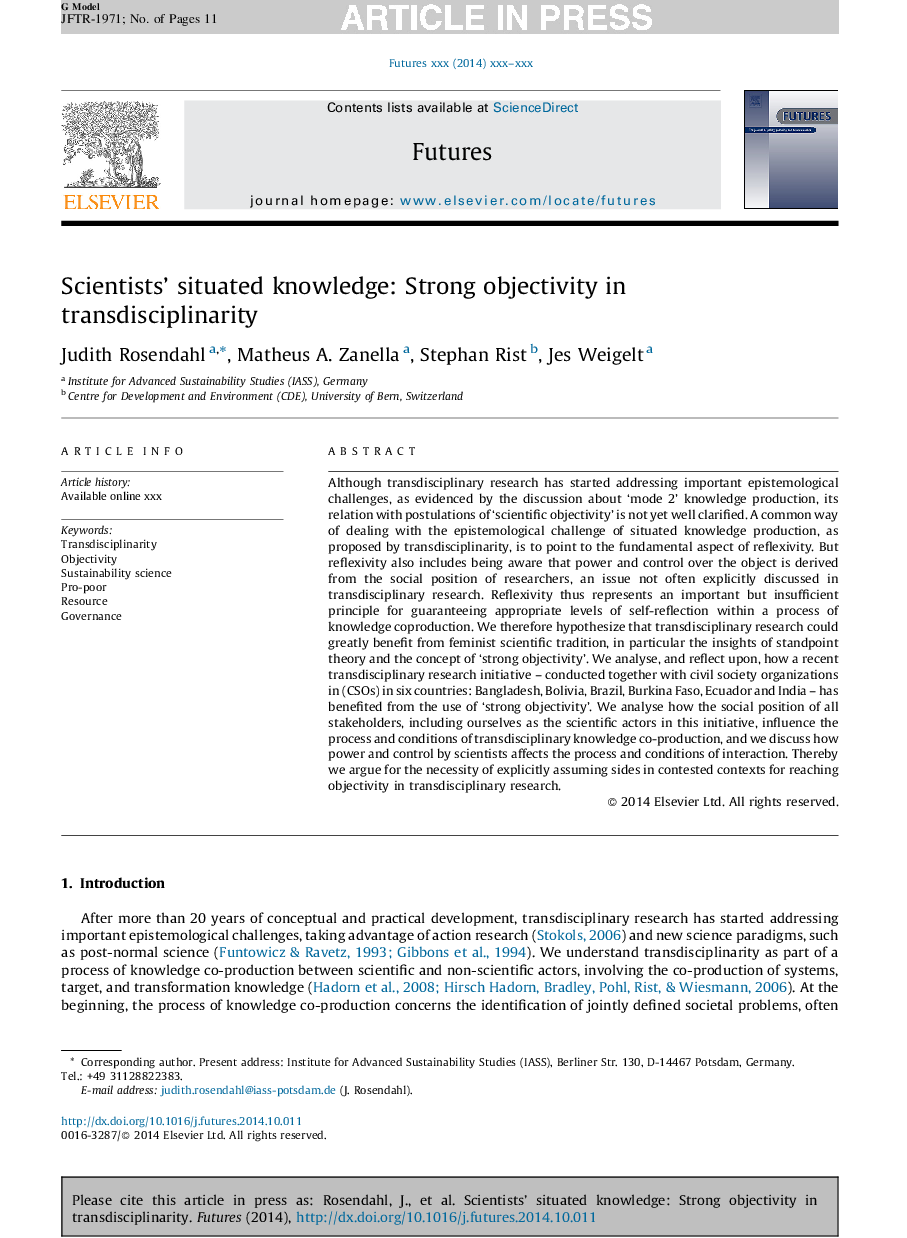| کد مقاله | کد نشریه | سال انتشار | مقاله انگلیسی | نسخه تمام متن |
|---|---|---|---|---|
| 7424294 | 1482765 | 2015 | 11 صفحه PDF | دانلود رایگان |
عنوان انگلیسی مقاله ISI
Scientists' situated knowledge: Strong objectivity in transdisciplinarity
ترجمه فارسی عنوان
علم دانشمندان: عینیت قوی در میان رشته ای
دانلود مقاله + سفارش ترجمه
دانلود مقاله ISI انگلیسی
رایگان برای ایرانیان
کلمات کلیدی
تربیت دینی، اهمیت دانش پایدار، طرفدار فقرا، منبع، حکومت،
ترجمه چکیده
گرچه تحقیقات فرا رشته ای در مورد چالش های معرفت شناختی مهم شروع شده است، همانطور که در بحث در مورد تولید دانش 2 حالت 2 نشان داده شده است، ارتباط آن با پیش فرض های «عینیت علمی» هنوز مشخص نیست. یک راه معمول برای مقابله با چالش معرفت شناختی تولید دانش موجود، همانطور که توسط میان رشته ای پیشنهاد شده است، اشاره به جنبه اساسی بازتابی است. اما بازتابی نیز شامل آگاهی از این است که قدرت و کنترل جسم از موقعیت اجتماعی محققان، مسئله ای است که اغلب در تحقیقات میان رشته ای به طور صریح مورد بحث قرار نمی گیرد. بنابراین، بازتاب پذیری یک اصل مهم اما کم کافی برای تضمین سطوح مناسب خود بازتاب درون فرایند تولید دانش است. بنابراین فرض ما بر این است که تحقیقات میان رشته ای می تواند از سنت علمی فمینیستی، به ویژه بینش نظریه دیدگاه و مفهوم «عینیت قوی»، سود ببرد. ما تجزیه و تحلیل می کنیم و بر این موضوع تأکید می کنیم که چگونه یک طرح تحقیقاتی بین رشته ای در سازمان های جامعه مدنی در شش کشور: بنگلادش، بولیوی، برزیل، بورکینافاسو، اکوادور و هند، از استفاده از "عینیت قوی" ' ما تجزیه و تحلیل می کنیم که چگونه موقعیت اجتماعی همه ذینفعان، از جمله خودمان به عنوان بازیگران علمی در این ابتکار، بر فرآیند و شرایط همکاری تولید دانش بین رشته ای تأثیر می گذارند و ما بحث می کنیم که چگونه قدرت و کنترل توسط دانشمندان بر روند و شرایط تعامل اثر می گذارد. به این ترتیب ما برای ضرورت به صراحت به طرفین در زمینه های متضاد برای دستیابی به عینیت در تحقیقات میان رشته ای استدلال می کنیم.
موضوعات مرتبط
علوم انسانی و اجتماعی
مدیریت، کسب و کار و حسابداری
کسب و کار و مدیریت بین المللی
چکیده انگلیسی
Although transdisciplinary research has started addressing important epistemological challenges, as evidenced by the discussion about 'mode 2' knowledge production, its relation with postulations of 'scientific objectivity' is not yet well clarified. A common way of dealing with the epistemological challenge of situated knowledge production, as proposed by transdisciplinarity, is to point to the fundamental aspect of reflexivity. But reflexivity also includes being aware that power and control over the object is derived from the social position of researchers, an issue not often explicitly discussed in transdisciplinary research. Reflexivity thus represents an important but insufficient principle for guaranteeing appropriate levels of self-reflection within a process of knowledge coproduction. We therefore hypothesize that transdisciplinary research could greatly benefit from feminist scientific tradition, in particular the insights of standpoint theory and the concept of 'strong objectivity'. We analyse, and reflect upon, how a recent transdisciplinary research initiative - conducted together with civil society organizations in (CSOs) in six countries: Bangladesh, Bolivia, Brazil, Burkina Faso, Ecuador and India - has benefited from the use of 'strong objectivity'. We analyse how the social position of all stakeholders, including ourselves as the scientific actors in this initiative, influence the process and conditions of transdisciplinary knowledge co-production, and we discuss how power and control by scientists affects the process and conditions of interaction. Thereby we argue for the necessity of explicitly assuming sides in contested contexts for reaching objectivity in transdisciplinary research.
ناشر
Database: Elsevier - ScienceDirect (ساینس دایرکت)
Journal: Futures - Volume 65, January 2015, Pages 17-27
Journal: Futures - Volume 65, January 2015, Pages 17-27
نویسندگان
Judith Rosendahl, Matheus A. Zanella, Stephan Rist, Jes Weigelt,
